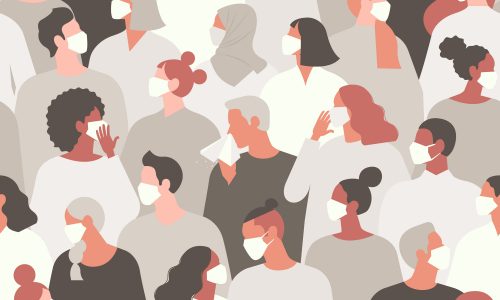Research and advocacy of progressive and pragmatic policy ideas.

Who Decides What’s Unacceptably Hateful?
We discuss official inaction on ‘hate-preachers’ in this editorial and who, ideally, should decide on how hateful speech is dealt with.
By Nelleita Omar4 October 2021
In our study on hate speech last year, we set out to identify whether there are patterns of agreement amongst ordinary citizens on what constituted hateful speech, including what constituted ‘very serious’ hateful speech.
While there were some differences of opinion and weightage between people of different ethnicities and religions, as was anticipated, there was a clear near-consensus that speech demonising or ridiculing or otherwise insulting any religion is seen as ‘very serious’ by the majority of our study respondents, regardless of demographic.
Apart from the sense of the act’s inherent wrongness as well as fears of inter-ethnic tension, what was interesting for us researchers was to hear respondents bring up the idea of reciprocity time and again in response to the hate speech samples.
“I wouldn’t want someone to say that about my religion.” “I would feel pretty angry if that was about Islam/Christianity/Buddhism/Hinduism/etc.”
We had expected that respondents would be able to empathise with others’ sense of rage or diminishment. But we had not expected to hear people from all walks of life so simply and widely articulate a key tenet of the Malaysian social contract: I respect what is sacred to you, you respect what is sacred to me. The same awareness and sensitivity did not extend to other areas; religion was the one consistent area of agreement.
The difference between what is expressed by our study respondents (in both quantitative and qualitative studies, if you’re wondering) and what plays out in the public arena is worlds apart, to put it mildly. Two Muslim preachers, Muhammad Zamri Vinoth Kalimuthu and Firdaus Wong Wai Hung, are not being brought to court to answer latest charges of incitement and insulting other religions as the attorney-general had decided against filing charges.
According to reports, the deputy public prosecutor representing the government position had informed the magistrate that the attorney-general will not prosecute the preachers as the police had classified their cases as “no further action”. This, despite the reportedly high number of police reports that have been made against the two preachers – a thousand police reports according to the civil society movement Aliran.
The theme of reciprocity and fairness – or lack thereof – also underlies criticism of the AG’s decision. We quote the same May 2021 Aliran piece: “If some stupid idiot insults Islam, quick action is taken – as it should be – to safeguard our unity and peaceful way of life…The same concern should have come to play in this instance…when any other faith is ridiculed and condemned.”
It is not a case of a lack of legislation in this instance – current laws have in fact been applied to arrest one of the preachers, Muhammad Zamri, on similar grounds back in 2019 (charges were not pressed then either). If we were to take issue with the law, it would be to argue that the laws are too broad and insufficiently defined, leading to laxness in some cases and over-punitiveness in others.
In this instance, we maintain that the larger deficiencies are in the institutions involved. The institutional deficiencies in addressing this case, and many others involving speech against minority groups, is apparent at many key levels. The police’s decision to close the case did not need to be justified, despite the number of reports and the risk to national harmony and security. The attorney-general’s decision did not need to be justified either. The silence of the Minister of Law, the Ministry of National Unity, the Ministry of Communications, to name the various portfolios with responsibility over the nation’s ‘harmony’ are not even remarked upon.
To be fair, these entities are dealing with very complex issues and we can only guess at the nature of undercurrents and considerations driving their decisions. For example, the risk of inflaming the numerous followers of controversial preachers cannot be discounted, nor the complex ties to geopolitical issues. But the fact remains that our current institutional approaches and mindsets to these problems are not sufficient, and worse, could be inadvertently licensing extremism. The arbitration of our delicate multi-ethnic and multi-religious population needs a major rethink.
In our original research piece last year, we asked the question: how can we, as a country, fairly evaluate what is unacceptably hateful? And how can we respond to different levels of hateful speech proportionately and sustainably? Given the institutional deficiencies today, we support efforts and policy recommendations to increase the level of accountability of the police as well as the attorney-general. Decisions that impact inter-group relations, amongst others, need to be explained and justified.
We also argue that apart from having a framework that defines and categorises hateful speech, there is an institutional gap today which does not allow for addressing these issues via civil means. There should be an avenue where civil complaints against hateful speech can be addressed, ideally by a qualified and independent body such as a tribunal or commission, with powers to restrict offending activities as well as to order restitution and rehabilitation. Examples of such entities exist in New Zealand, Australia and Japan, to name a few countries.
Having said that, tackling hateful speech, particularly in religious sermons, needs to involve the whole society and not just rely on official institutions alone. It would really be something to hear sermons counselling against ‘hate-preaching’ and concerted messages of peace, respect and yes, reciprocity, from those with moral authority such as public religious leaders and personalities. In the meantime, aggrieved parties in the non-case of the two preachers continue to fight to be seen and heard in the eyes of the law.
The Centre is a centrist think tank driven by research and advocacy of progressive and pragmatic policy ideas. We are a not-for-profit and a mostly remote working organisation.



